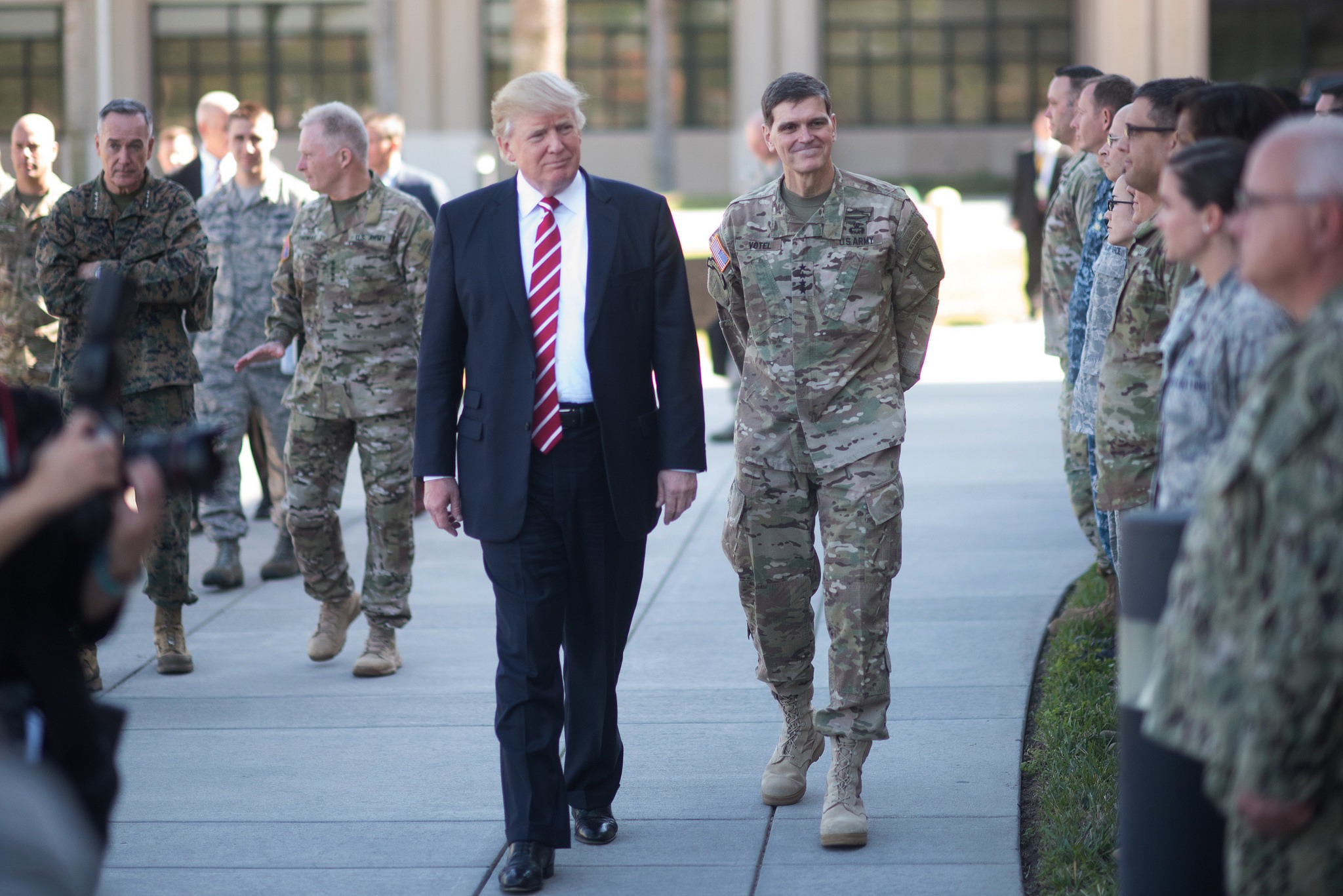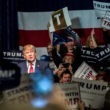Well, Trump has certainly done what he promised he would do, and more, especially on foreign policy. No fake news there. In only the first three weeks of his presidency he set in motion an almost total disruption of U.S. foreign policy as we have known it for the last seven decades. From this apparent chaos, Trump hopes to create a system that favors the United States and its interests.
As former National Security Adviser Lt. General Michael Flynn wrote in his February 13, 2017, resignation letter: “In just three weeks [Trump] has reoriented American foreign policy in fundamental ways to restore America’s leadership.” In truth, the Trump foreign policy chaos is likely to accelerate centrifugal forces in the global system that will be the death-knell of American exceptionalism and leadership, hastening a rebalancing of global power with the United States as just another player.
The outcome of this chaos and disruption is likely to be different from what the president intends, and it means a dramatically different modus operandi for U.S. foreign policy, with no hope of returning to the “old order.”
In the first three weeks Flynn referred to, the litany of disruptions heralding the new chaotic era is long: insulting Mexico; a phone call with Vladimir Putin, denouncing the strategic nuclear New Start agreement and seeking a different partnership with Russia; calling the 70-year-old NATO treaty “obsolete”; banning travelers from seven predominately Muslim countries; halting refugee entry into the country for 120 days and cutting the U.S. refugee admission target in half; declaring that the United States will stop China if it tries to take over islands in the South China Sea; cancelling U.S. participation in the Trans-Pacific Partnership trade agreement; seeking to reduce U.S. funding for international organizations; insulting the Australian Prime Minister over a trivial refugee issue; promising a massive military budget increase and military buildup while calling for an end to military “nation building”—and surely many more actions I have left out.
Defenders of the way business used to be done have been outraged, on behalf of alliances, friends, treaties, agreements, or the legacy of what they accomplished when they were in office. But the seemingly random, uncoordinated, free-form Trump assault on 70 years of U.S. foreign policy, in its somewhat childish way, may accelerate the rebalancing trend already well underway before January 20, 2017. A Clinton presidency might have delayed this trend, but, inevitably, we are seeing the emergence of a different, non-hegemonic international system, one already apparent since the late 1990s, a world more similar to the Great Powers of the 1890s than to the “Cold Warriors” busily defending the old order.
Over the past 28 years, since the end of the Cold War, while neo-conservatives raged on about the victory of democracy and American global domination as far as the eye could see and pundits could predict, beneath the apparently calm surface of American hegemony, cracks in the Cold War system were already emerging, sometimes with a helping hand from the U.S. administration of the moment.
While NATO expansion, which provided reassurance to the former Warsaw Pact nations, was seen as a vital part of the Cold War victory, the expanded reach of the alliance and an implied promise that countries on the Russian border might soon become part of the “West” set Russian teeth on edge, contributing to an inevitable revival of Russian power and its unilateral self-assertion in the world. The rise of China, which began even before the end of the Cold War, was not something the United States could “contain” by military force or assertive policy; it is something that must be accommodated by recognizing that power relationships have changed and the previous rules in the Pacific, even broader global rules, had to evolve.
U.S. diplomatic and military dominance in the Middle East had already eroded well before the Obama administration offered support to democracy movements. Iran was already engaged in cross-region support for regimes and movements, a process that goes back to 1979. Saudi support for fundamentalist, violent jihadism was already apparent. Al Qaeda existed since the mid-1990s, its appeal amplified by the U.S. military presence in Saudi Arabia, the spiritual home of Sunni Islam. The Bush administration accelerated the cracking of the Middle East political glacier by invading Iraq. The later military “surge” put a pretty face on what was a strategic, military, and political failure and no sustained increase of U.S. troops could have guaranteed security or prevented the outbreak of tension between Sunni and Shia in the region.
Wherever one looks, the unpredictability of the Trump White House is paving the way toward the end of exceptionalism and American leadership.
Significant and growing U.S. counter-terrorism efforts that began in the Clinton administration, expanded with Bush’s Iraq invasion, and doubled-down with Obama’s drone strikes and special operations deployments did little to stem the metastasizing terrorist organizations. U.S. policy may even have stimulated the expansion and attractiveness of terrorist behavior by providing the extremists apparent evidence, however untrue, that the United States was an enemy of Islam.
Other fractures in the system were also appearing before Trump. Although the United States had been central to the creation of the global security and financial institutions of the Cold War, by 2015 both China and Russia had created new international institutions: organizations like the Shanghai Cooperation Organization (China, Russia, four other members, and organizational ties with India, Pakistan, and Turkey, among others, but not the United States); the Asian Infrastructure Investment Bank (57 members, including the U.K., but not the United States); and the Regional Comprehensive Economic Partnership (16 Asian nations, including China and India). In addition, Turkey, long a close NATO ally, resisted using its territory to create a northern front in the 2003 invasion of Iraq. And Indian military power and international assertion have been well under way over the past 20 years.
Almost all of Trump’s foreign policy actions have pumped on the gas, incentivizing others to accelerate the redistribution of power and influence and undermining of the former order. It is as if he intended, through disruption, to blow up business as usual. By unleashing battles with nations allied with the United States since the 1940s, insulting neighbors, abandoning carefully negotiated trade agreements, and asserting that America should come first, Trump has pushed buttons around the globe. The result is even less U.S. leadership and even more “go-it-alone” behavior.
As Trump moves close to Putin, the architecture of sanctions against Russia for annexing Crimea and invading Ukraine crumble and both Germany and France could move closer to Russia. As the United States emphasizes “old energy” and rejects the existing architecture of global trade agreements and dismisses international climate accords, China asserts a stronger role in global climate change and trade discussions. As the U.S. stance toward Iran toughens, China emerges as a potentially potent partner for Iran.
The Iraq invasion already condemned the U.S. to a marginal role in Syria; the Trump stance accelerates a role Russia was already playing in that country, including closer Turkey-Russia cooperation, independent of the United States. Russia organizes a conference to explore resolution to the conflict in Afghanistan, and invites everyone except the United States and NATO countries supporting the Kabul regime.
In Europe the centrifugal trend is very clear. The U.K. has decided to leave the E.U., further weakening that bulwark of the old order. France may move toward a more authoritarian regime this spring, with consequences for the future of European security and economic arrangements. The President of the E.U. Council of Ministers, Donald Tusk, described the changes in Washington as one of the “threats” now facing the E.U. And Germany, which has emerged as a more assertive power, faces difficult choices about how far it moves toward accommodation with Russia and whether it should develop more traditional instruments of power, such as military forces and nuclear weapons.
As the new German president, Frank-Walter Steinmeier put it: “the old world of the 20th Century is gone.”
President Obama seemed to understand that centrifugal forces were at work in the world and, whatever the critique of his foreign policy, was working to adapt the United States to that change, while continuing its leadership. He asserted the necessity, even the inevitability, of American leadership, but with a lighter and less interventionist hand. Wherever one looks, the unpredictability of the Trump White House—its insistence on the foreign and economic policy nationalism rooted in “America First,” its hostility toward immigrants, its stalwart assertion of the critical need to protect America’s borders, his determination to expand America’s military—all point toward the end of exceptionalism and American leadership, as well.
History was already writing a concluding chapter to the role of the United States as global leader. That conclusion may come faster than we expect, with high risk and dramatic change. It is not clear that the Trump administration will be able to cope with this change; dealing with the arrival of the new international order may fall to the next administration, should this one survive the chaotic transition.
Gordon Adams is Professor Emeritus at American University, a Fellow at the Stimson Center, and a policy consultant, living in Brunswick, Maine.







0 Comments